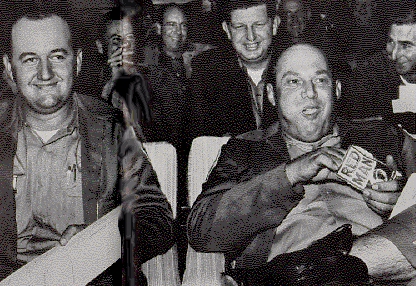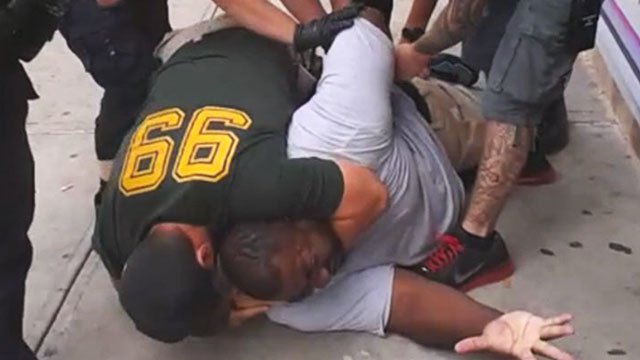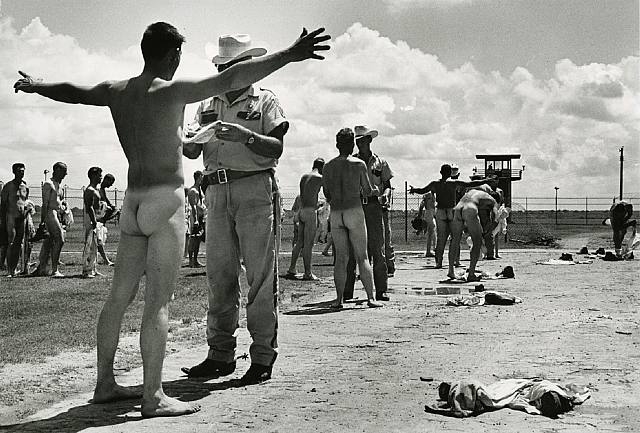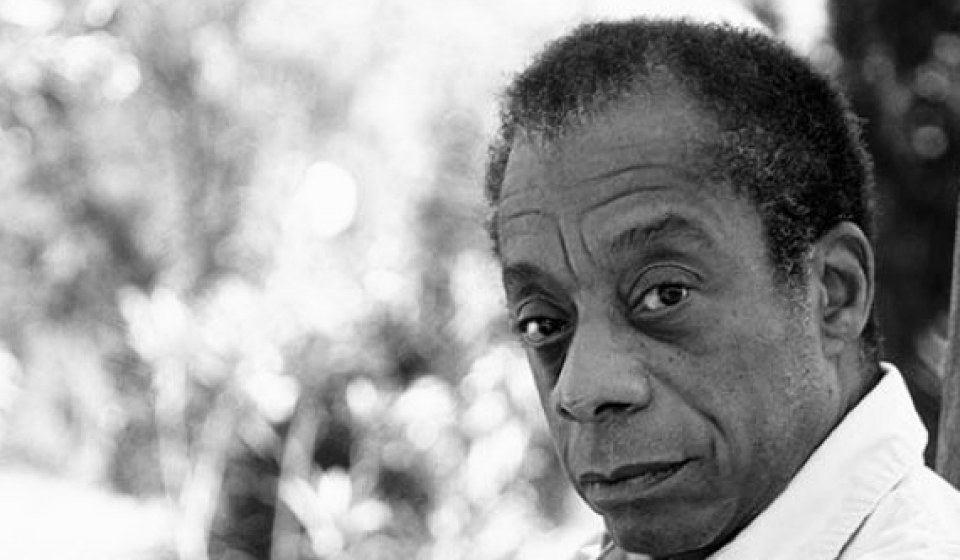By the age of 20, I was aware of the frequent exercise of authority in illegitimate, violent, corrupt, and otherwise abusive ways.
The recent cases in both Ferguson, Missouri, and New York City concerning the failure of grand juries to indict police officers for killing Michael Brown and Eric Garner, both African-American, led me to think about authority figures in our society and how we respond to them.
In the New York case, Eric Garner tried to discuss the situation before he was swarmed by several officers and suffocated to death in an action that the medical examiner ruled a homicide. In Missouri, Michael Brown was less cordial and reacted in a way that most adults know is highly likely to escalate what, from its inception, was a problem encounter with the police officer.
During my undergraduate days in college during the 1960s at Southwestern University in Georgetown, Texas, I was a sociology major and a psychology minor. During one psychology seminar, my professor, Dr. Douglas Hooker, explained to me my most prominent personality deficit, namely, that I had a problem with authority.
At the time, I understood this analysis as a significant failure in my development. Upon reflection, however, I realized that what I had a problem with was not authority, but the abuse of authority. My problem was with the illegitimate, discriminatory, and corrupt use of authority, not authority itself.
At the young age of 10, I learned from a trusted African-American woman about systematic discrimination against African-Americans.
At the young age of 10, I learned from a trusted African-American woman about systematic discrimination against African-Americans. It horrified me that a person I loved and trusted and who was always kind to me would be treated the way she and other people of color were treated by the authorities, backed by a white majority.
By the time I was in the seventh grade, I knew of the horrors of American slavery and how that institution had been supported by most Southern churches, law enforcement officials, politicians, and even my history teacher — virtually everyone in authority that I might encounter.
When I was 17, I tried to organize joint meetings of my white Methodist Youth Fellowship group in Port Arthur with youth from similar groups in the African-American and Hispanic Methodist churches. The authorities in charge would not permit such activity.
When the Montgomery bus boycott was underway, I saw the authorities use the police, in consort with white supremacy groups, to keep African-Americans in their place at the back of the bus and in jobs with little upward mobility. I had a problem with that abuse of authority.
In 1963, Dr. Martin Luther King, Jr. wrote “Letter From Birmingham Jail,” when he and hundreds of others were imprisoned for daring to nonviolently assert their rights against segregation in Birmingham, Alabama. Their nonviolent actions infuriated the authorities and led the police to unleash unprecedented violence against them. To say that I had a problem with such authorities would be an understatement.
I learned of the killings of civil rights workers James Chaney, Andrew Goodman, and Michael Schwerner in Mississippi.
A year later, along with most Americans, I learned of the killings of civil rights workers James Chaney, Andrew Goodman, and Michael Schwerner in Mississippi. Those murders were committed through a conspiracy among the White Knights of the Ku Klux Klan, the Neshoba County Sheriff’s Office, and the Philadelphia, Mississippi, Police Department. This was another example of unconscionable and illegal abuse of authority.

Deputy Cecil Price, left, and Lawrence Rainey, Neshoba County, Mississippi, Sheriff, both members of the Ku Klux Klan. at 1964 hearing for the murder of civil rights workers Chaney, Goodman, and Schwerner.
In 1965, when I saw on television the beatings of people marching for voting rights by the police on the Edmund Pettis Bridge in Selma, Alabama, I was horrified by intentional, sadistic abuse by the authorities. And around that same time, Selma school board authorities fired 32 African-American teachers for the simple act of trying to register to vote.
The campaign for voting rights that culminated in a march from Selma to Montgomery in 1965 resulted in several deaths. Jimmie Lee Jackson was killed in cold blood by an Alabama State Trooper. Unitarian Universalist minister Rev. James Reeb died from a beating by members of the Ku Klux Klan, which included members of law enforcement. And a Detroit supporter of the march, Viola Liuzzo, was murdered by Klansmen accompanied by an FBI informant. Hundreds of others were beaten and maimed by white segregationists because the authorities refused to protect them or actively participated in their abuse.
In 1965, while working in a summer job for the Texas Department of Corrections at the Ferguson Unit, I witnessed the coverup by both Warden Jack Kyle and Assistant Warden Kenneth Coleman, the two top officials with nearly unlimited authority at the prison, of beatings of inmates by other prison officials. They directly threatened me if I took my concerns to higher authorities.
That same summer, when I was traveling back to the prison unit one Sunday evening, I came upon a massive gathering on the square at Huntsville, Texas. Unknown to me at the time, about 30 people were conducting a sit-in at a cafe on the square protesting the segregation of the facility. A large crowd had gathered around the square. I parked my car and walked to a corner for a better look and to learn what the gathering was all about.
When I was about 10 feet away from the corner I saw a white man begin to beat up a reporter for the ‘Huntsville Item.’
When I was about 10 feet away from the corner I saw a white man begin to beat up a reporter for the Huntsville Item, knocking the reporter and his glasses to the sidewalk. The reporter was a mere onlooker, as was a police officer standing three feet away, who observed the beating and did nothing to stop it or take any action against the assailant.
When President Lyndon Johnson began his escalation of the Vietnam War on false pretenses, I was acutely aware of the abuse of presidential authority, with the acquiescence of Constitutionally-mandated congressional authority.
At some point in my early years, I became aware of the systematic genocide against Native Americans in the U.S. perpetrated by those in authority from several presidents on down to the lowest level officials. This sorry history began, of course, with the genocide committed by Christopher Columbus on Hispanola under the authority of the Catholic Monarchs of Spain.
By the age of 20, I was aware of the frequent exercise of authority in illegitimate, violent, corrupt, and otherwise abusive ways. But I also learned how to interact with various authorities — what and how I could act without jeopardizing my life. Each authority is different. For instance, I could argue with the president of my university when he disapprovingly reviewed galleys of a column I had written for the student newspaper, without fear that I would be harmed in some way. I could argue with my teachers, placing at risk only my grade in the class. I could argue with my parents, risking mainly their disapproval or the imposition of a loss of privileges, such as using the family car. In each of these situations, I understood the boundaries for my responses and actions.
But when it came to law enforcement officers as figures of authority, I understood that my responses and actions were severely circumscribed if I did not want to risk arrest or serious bodily harm, even though I was a white person. For people of color or from a disdained ethnicity, the parameters of such interactions are far more circumscribed, mainly because police officers reflect the social milieu. This is, perhaps, best understood by reference to an essay written to his name-sake nephew by James Baldwin in 1962.
Baldwin explained that the white people of America do not realize, are not aware of, the harm that they have done to people born as second-class citizens.
Baldwin explained that the white people of America do not realize, are not aware of, the harm that they have done to people born as second-class citizens, particularly impoverished African-Americans, and do not even acknowledge the conditions in which his nephew was born. This ignorance of the “other” creates a kind of innocence among them, Baldwin wrote, as he went on to explain the realities of the world to his 15-year old nephew:
. . . I am writing this letter to you to try to tell you something about how to handle them, for most of them do not yet really know that you exist. I know the conditions under which you were born for I was there. Your countrymen were not there and haven’t made it yet. . . . This innocent country set you down in a ghetto in which, in fact, it intended that you should perish. Let me spell out precisely what I mean by that for the heart of the matter is here and the crux of my dispute with my country. You were born where you were born and faced the future that you faced because you were black and for no other reason. The limits to your ambition were thus expected to be settled. You were born into a society which spelled out with brutal clarity and in as many ways as possible that you were a worthless human being. You were not expected to aspire to excellence. You were expected to make peace with mediocrity. Wherever you have turned, James, in your short time on this earth, you have been told where you could go and what you could do and how you could do it, where you could live and whom you could marry.
Take no one’s word for anything, including mine, but trust your experience. Know whence you came. If you know whence you came, there is really no limit to where you can go. The details and symbols of your life have been deliberately constructed to make you believe what white people say about you. Please try to remember that what they believe, as well as what they do and cause you to endure, does not testify to your inferiority, but to their inhumanity and fear.
Please try to be clear, dear James, through the storm which rages about your youthful head today, about the reality which lies behind the words “acceptance” and “integration.” There is no reason for you to try to become like white men and there is no basis whatever for their impertinent assumption that they must accept you. The really terrible thing, old buddy, is that you must accept them, and I mean that very seriously. You must accept them and accept them with love, for these innocent people have no other hope. They are in effect still trapped in a history which they do not understand and until they understand it, they cannot be released from it. They have had to believe for many years, and for innumerable reasons, that black men are inferior to white men.
Baldwin concludes by telling his nephew that he cannot be free until the dominant white society is free — free from their ignorance of the “other” and from their own history. And that is an important part of the problem with the police killing of African-Americans. Not only are the police, particularly white policemen, given positions of enormous authority with a license to kill, but they lack understanding of African-American humanity. This ignorance or innocence leads them to fear such people and to exercise their authority in incredibly destructive ways.
Too many people are hired as police officers without an adequate assessment of
their personalities.
Too many people are hired as police officers without an adequate assessment of their personalities, shaped as they may be by the dominant society’s failure to grasp the experience of both whites and African-Americans in this country. This failure leads to a propensity to dehumanize the “other.” When this propensity is closely aligned with an authoritarian personality, we have an enormous social problem.
Erich Fromm described the authoritarian personality as one which desires to control others, is self-confident, and perceives itself as strong and powerful. Its purpose is “to master and control another individual, to make him a helpless object of one’s will, to become his ruler, to dispose over him as one sees fit and without limitations.” A threat to such power can lead a person with an authoritarian personality to strike out in dangerous ways.
While Baldwin discusses an authoritarian and dominant white society, Fromm focuses on the exercise of rational authority and irrational authority by an individual, but they come to similar conclusions as seen in this excerpt from Fromm:
Rational authority is the recognition of authority based on critical evaluation of competences. When a student recognizes the teacher’s authority to know more than him, then this is a reasonable evaluation of his competence. The same is the case, when I as the passenger of a ship recognize the authority of the captain to make the right and necessary decisions if in danger. Rational authority is not based on excluding my reason and critique but rather assumes it as a prerequisite. This does not make me small and the authority great but allows authority to be superior where and as long it possesses competence. . . . Irrational authority is different. It is based on emotional submission of my person to another person . . . .
For Fromm, the submissive individual feels “powerlessness, fear, and admiration” for the person who is seen as a leader. But it is only rational authority that forms a solid foundation of a culture. Finally, Fromm concludes that “the individual’s goal must be to become his own authority; i.e. to have a consciousness in moral issues, conviction in questions of intellect, and fidelity in emotional matters. However, the individual can only have such an inner authority if he has matured enough to understand the world with reason and love. The development of these characteristics is the basis for one’s own authority and therefore the basis for political democracy.”
Our society is not so much interested in rational authority as it is irrational authority.
Baldwin, Fromm, and my own experience have taught me that we have a society, a culture, where the authority of the police, in general, and many others in similar positions expect, even demand, submission and powerlessness, while engendering fear in the other. Our society is not so much interested in rational authority as it is irrational authority.
I write this not to condemn all police officers. I spent 7-1/2 years of my professional life as a police legal adviser in two communities. I met many officers with the maturity and understanding that is necessary to fulfill their duties without ever drawing a gun or choking another person to death. I also met officers whose very presence was a danger to the well-being of the community.
Before giving a person life-or-death control over others, we should, if we are to be a mature society, separate out those who cannot be genuine leaders with the necessary competencies and cultural understandings of the “other.” We should find those candidates who don’t see the “other” as worthless and something less than fully human — in fact, who don’t see anyone as the “other.” Until we do so, we will continue to experience the deadly consequences of our failure.
But I can’t help returning to James Baldwin’s essay and the point he makes about the innocence of the ruling classes and all who buy into the prevailing mindset about African-Americans and the “other,” whoever that may be.
The ruling class in Ferguson never intended to allow the death of Michael Brown to
reach a courtroom.
The ruling class in Ferguson never intended to allow the death of Michael Brown to reach a courtroom. From the police chief, to the mayor, to the governor, to the district attorney, the fix was in from the beginning. The evidence, public opinion, and the grand jury process were manipulated to assure an outcome that would not hold the police officer to account. This process was a profound abuse of authority at many levels and a corruption of our society’s expressed values.
In somewhat different ways, the grand jury process was manipulated in New York, as well. Officers directly involved with the death of Eric Garner were given immunity for their testimony, leaving only the officer who used an improper choke hold to be held to account, which he will not be. This is a result that should make any rational person cry out in anguish for our people and our country.
How could adults in positions of enormous authority think selling a single cigarette (if Eric Garner did that on this occasion) was worth swarming all over a man who was willing to talk about it and kill him? That they did not intend to kill him is beside the point. They had no perspective about their actions, perhaps because they did not value Garner’s life and did not understand or appreciate the way he lived or had to live. He was the “other.”
When it comes to racial matters and how we view the “other” in our midst, the dominant white society has much to learn. It seems apparent that while progress has been made since Baldwin wrote his essay, we have a very long way still to go to drive out illegitimate, abusive, and corrupt authority from this country and its institutions.
Read more articles by Lamar W. Hankins on The Rag Blog.
[Rag Blog columnist Lamar W. Hankins, a former San Marcos, Texas, City Attorney, also blogs at Texas Freethought Journal. This article © Texas Freethought Journal, Lamar W. Hankins.]





















Apparently Lamar is not the only person in his narrative who had a problem with authority. Michael Brown had an issue with the authority of a shop keeper to insist that he pay for the items he was taking. He had an issue with the authority of the policeman who wanted to exit his car to talk to him. Some question why the officer didn’t simply let him walk away and resolve it later. I personally am glad he didn’t. Who knows whom the next victim of Michael Browns temper, anger, and disregard for others might have been. Who knows what damage might have been inflicted upon his next victim. I am not a big fan of cops, but in Ferguson, Michael Brown is six feet down, and that is exactly where he should be.
The problem the left has is that they made a martyr out a thug and the sad fact is that it detracts from the legitimate outrage that has developed about the killing of Eric Garner.
Neither was racially motivated and the veneer of racism that the left trots out constantly detracts from real instances of racism. I no longer even bother to care when someone is accused of racism, its just more left wing histrionics i think to myself.
So the summary is that Michael Brown is dead and thats probably a good thing. Eric Garner is dead and that is a crying shame. The police are out of control and the left’s hysterical cries of racism and police abuse about EVERYTHING give the real racists and police abusers cover. Way to go Progressives!
– Proud to be an Extremist2TheDHS
So far as we know Michael Brown was unarmed. He may have tried to gain control of Officer Wilson’s weapon but he did not succeed. When he was shot he had no weapon and he was no longer in close physical proximity to Officer Wilson.
Rational people in a free society have every right to ask “Why are unarmed people being murdered by the police?”
We are not safe if the police feel they have the right to murder those people they feel are a threat or those whom they “dislike”.
It’s odd that “Conservatives” who constantly reiterate that the “government” is a “tyranny” and that they need their Second Amendment rights because of their fear of a “police state” apparently have little or no problem with police officers usurping the Constitutional authority of the courts and juries by acting as judge, jury and executioner.
Any police officer who kills an unarmed person should be subject to a thorough trial and internal police review – AT THE VERY LEAST.
Why are we fighting to “protect our Freedom” in places like Iraq and Afghanistan if the Republican Party and today’s “Conservatives” have no respect for and place no value upon Freedom?
Sadly, the truth lies in the fact these folks – Republicans and so-called Conservatives – are the submissive authoritarian types who worship “strong leaders”- especially, it seems, if these “leaders” detest and brutalize the poor and the weak – and lack the moral and intellectual courage to confront the strong evidence of their own inherent racism and bias.
Why are we fighting to “protect our Freedom” in places like Iraq and Afghanistan if the Republican Party and today’s “Conservatives” have no respect for and place no value upon Freedom?
Simple answer is we are NOT fighting for freedom in Afghanistan or Iraq or Syria or Yemen or Libya. Those are quite clearly operations by an empire to enact its geo political agenda. Anyone stupid enough to be a storm trooper in those wars is not a hero, they are simply paid killers for the corporations and institutions whose interests are being served.
And just as clearly, Singh, an unarmed thug who beats up shop keepers, hits a cop in the face multiple times and then reaches into a cop car trying to shoot the cop with his own gun is dangerous to those around them. The dumb ass thug then chose to initiate a fight with an officer pointing a gun at him. All he had to do after all of his misdeeds, was to stop, and get on the ground as he was instructed to do. Michael Brown chose to be judge, jury and executioner. And he was stupid enough, or high enough, to try and serve his sentence on an armed police officer. I would have shot him myself if he had reached into my car, hit me in the face and tried to take my weapon.
Save your outrage for the poor man in NY trying to make a living by selling cigarettes who simply asked to be left alone and was instead attacked by criminal cops intent on stomping out any who dared to be non conforming.
– Proud to be an Extremist2TheDHS
Like the article.
But I think that personality is intentionally sought, selected for, not overlooked.